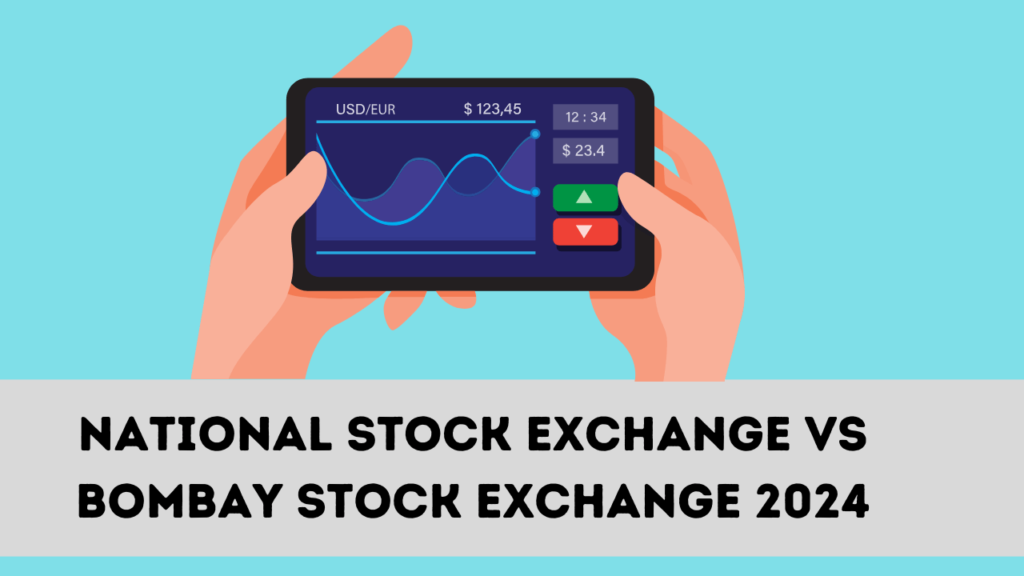The National Stock Exchange (NSE) and the Bombay Stock Exchange (BSE) are two pillars of India’s financial market. Both play pivotal roles in the trading ecosystem, offering platforms for buying and selling stocks, bonds, and other financial instruments. For investors and traders, understanding the differences between these two exchanges in 2024 is crucial to making informed decisions. In this article, we’ll dive deep into the National Stock Exchange vs Bombay Stock Exchange 2024 comparison, exploring their features, advantages, and key updates.
Overview of National Stock Exchange (NSE) and Bombay Stock Exchange (BSE)
The NSE and BSE are India’s leading stock exchanges, but they differ in various aspects, including market capitalization, trading volume, and technological infrastructure.
- National Stock Exchange (NSE)
Established in 1992, the NSE introduced electronic trading to India. It is known for its advanced technology, high liquidity, and benchmark index, Nifty 50. - Bombay Stock Exchange (BSE)
Founded in 1875, the BSE is Asia’s oldest stock exchange. It is home to the Sensex index and has a rich history of fostering India’s financial growth. The BSE is known for its extensive list of listed companies and traditional roots.
National Stock Exchange vs Bombay Stock Exchange: Key Features
1. Trading Volume
NSE leads in terms of trading volume. Its advanced systems and high-frequency trading capabilities attract a majority of the trading community. In 2024, the NSE continues to dominate in terms of daily trades and liquidity.
2. Market Capitalization
The BSE boasts a larger market capitalization, primarily because of its extensive list of listed companies. As of 2024, BSE has over 5,500 companies listed, compared to NSE’s approximately 2,000 companies.
3. Benchmark Indices
NSE’s benchmark index, Nifty 50, comprises 50 major companies representing various sectors. It is widely used as a performance indicator for the Indian economy.
BSE’s benchmark index, Sensex, tracks 30 large and established companies, offering insights into the broader market trends.
4. Technology and Innovation
NSE is a frontrunner in adopting technology. It introduced algorithmic trading in India and offers state-of-the-art trading platforms. BSE, while keeping pace, has focused on initiatives like the BSE STAR MF platform for mutual fund investments.
5. Settlement Cycles
Both exchanges now follow the T+1 settlement cycle as of 2024, reducing the time it takes for transactions to be completed and funds or securities to be delivered.
National Stock Exchange vs Bombay Stock Exchange: Trading Experience in 2024
Trading Platforms
- NSE: Known for its user-friendly interface and faster order execution, the NSE platform is ideal for day traders and high-frequency traders.
- BSE: While slightly slower in terms of order matching speed, the BSE offers a robust trading platform with comprehensive data analytics tools.
Listing Requirements
- NSE has stringent listing requirements, attracting large-cap companies.
- BSE’s more flexible requirements cater to small-cap and mid-cap companies, making it a haven for diverse investment opportunities.
Accessibility for Retail Investors
Both exchanges are accessible to retail investors, but the NSE’s higher trading volume and liquidity make it a preferred choice for many. The BSE, however, provides access to a broader range of stocks, including penny stocks and small-cap companies.
National Stock Exchange vs Bombay Stock Exchange: Pros and Cons
Advantages of NSE
- High liquidity ensures quicker trade execution.
- Advanced technology supports seamless trading.
- Focus on derivatives trading, making it the top choice for options and futures traders.
Disadvantages of NSE
- Limited number of listed companies compared to BSE.
- Higher competition due to its popularity among traders.
Advantages of BSE
- Extensive list of companies provides diverse investment options.
- Ideal for long-term investors focusing on small-cap and mid-cap stocks.
- Strong legacy and reliability.
Disadvantages of BSE
- Lower trading volume affects liquidity.
- Slightly slower order execution compared to NSE.
Which Exchange Should You Choose in 2024?
The choice between the National Stock Exchange and Bombay Stock Exchange in 2024 depends on your trading goals and preferences:
- If you’re a day trader or derivatives trader, the NSE is your best bet due to its liquidity and advanced technology.
- If you’re a long-term investor looking for diverse opportunities, the BSE’s vast list of companies can provide a broader range of options.
Recent Developments in NSE and BSE in 2024
Both exchanges have taken significant steps to enhance trading experiences:
- NSE Updates
- Enhanced algorithmic trading infrastructure.
- Introduction of new financial derivatives to cater to advanced traders.
- BSE Updates
- Expansion of the BSE SME platform to support small and medium enterprises.
- Focus on ESG (Environmental, Social, and Governance) investing by listing green bonds.
National Stock Exchange vs Bombay Stock Exchange: Impact on the Indian Economy
The NSE and BSE contribute significantly to the Indian economy. The NSE drives innovation and liquidity, while the BSE supports inclusivity by listing a broader spectrum of companies. Both exchanges are instrumental in attracting foreign investments and enabling capital formation.

Conclusion: National Stock Exchange vs Bombay Stock Exchange 2024
In the debate of National Stock Exchange vs Bombay Stock Exchange 2024, both exchanges shine in their unique ways. The NSE is synonymous with speed, technology, and liquidity, making it ideal for active traders. The BSE, with its legacy and extensive listing, remains the backbone of India’s stock market.
Understanding the strengths and limitations of each exchange allows investors to align their strategies with their goals. Whether you choose the National Stock Exchange or the Bombay Stock Exchange in 2024, both provide robust platforms to grow your investments and achieve financial success.
Read also: Is Option Trading Good for Beginners in 2024 in India?
